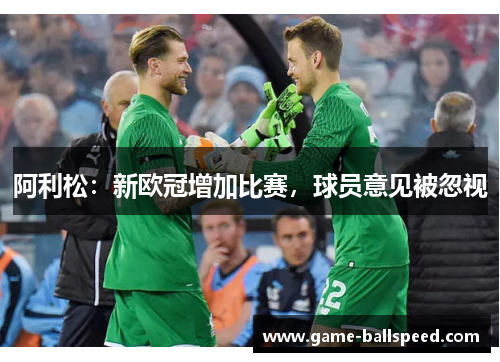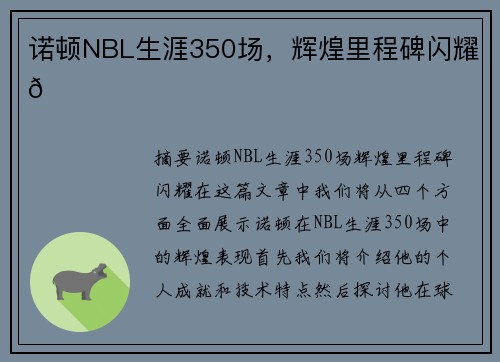阿利松:新欧冠增加比赛,球员意见被忽视
Article Abstract:
球速体育The article explores Alisson's perspective on the new format of the Champions League, highlighting the disregard for player opinions. It delves into four key aspects: the impact on players, challenges for the clubs, the financial implications, and the role of football governing bodies. The discussion culminates in a comprehensive summary of the consequences of neglecting player perspectives on the tournament's expansion.

---
1、Impact on Players
Amid the proposal to expand the Champions League, Alisson's viewpoint sheds light on the potential impact on players' physical and mental well-being. The increased number of matches not only alters the competitive landscape but also raises concerns about player fatigue and injury risks. Moreover, the disregard for their opinions undermines the significance of their roles in shaping the sport's future.
Alisson's viewpoint reveals the need for a balanced approach that prioritizes players' welfare while considering the evolving demands of modern football. The lack of consultation on this matter reflects a broader issue in the decision-making process, where player perspectives are undervalued, impacting the overall sustainability of the sport.
2、Challenges for the Clubs
Alisson's concerns also highlight the potential challenges that clubs may face with an expanded Champions League format. The increased fixture congestion could strain the resources and depth of squads, affecting their ability to compete effectively on multiple fronts. Additionally, the financial burden of accommodating additional matches without adequate consultation poses a significant challenge to the clubs' long-term planning and stability.
It is evident that Alisson's insights underscore the need for a collaborative approach between the relevant stakeholders to address the challenges that an expanded tournament presents. The lack of player involvement in decision-making processes could exacerbate existing disparities and disrupt the competitive balance, ultimately impacting the clubs' sustainability.
3、Financial Implications
Alisson's perspective on the new Champions League format draws attention to the significant financial implications for players and clubs. The lack of consideration for their input in such matters not only undermines their welfare but also jeopardizes the financial stability of the sport. The potential loss of earning opportunities and increased financial burdens without adequate consultation could have far-reaching repercussions.
Alisson's stance emphasizes the critical need for transparent and inclusive discussions that encompass the financial implications of tournament expansion. The oversight of player opinions reflects a broader disconnect in the decision-making processes, highlighting the urgency for reforms that prioritize the holistic interests of all stakeholders.
4、Role of Football Governing Bodies
Alisson's perspective brings to the fore the role of football governing bodies in the decision-making process concerning significant changes to prestigious tournaments like the Champions League. The exclusion of player opinions underscores a concerning trend in the governance of football, where decisions are made without adequately considering the perspectives of those directly involved in the sport.
Alisson's insights underscore the imperative for a more inclusive and transparent approach to decision-making within football governing bodies. By neglecting player opinions, the credibility and legitimacy of the decision-making process are undermined, posing challenges to the long-term sustainability and integrity of the sport.
总结:
The neglect of player opinions in the expansion of the Champions League has significant implications for the sport. Alisson's perspective sheds light on the potential impact on players, challenges for the clubs, financial implications, and the role of football governing bodies. This disregard for player input not only highlights existing flaws in the decision-making processes but also exposes the broader issues of sustainability and inclusivity within football governance. It is imperative for stakeholders to recognize the importance of player perspectives and work towards a more collaborative and informed approach to shaping the future of the sport.


